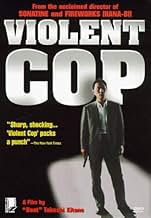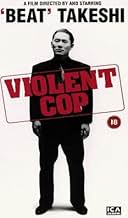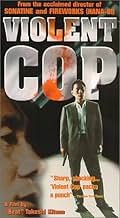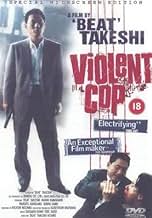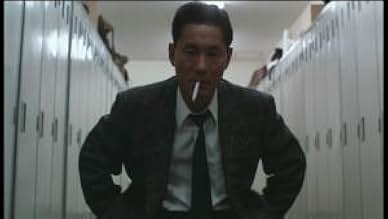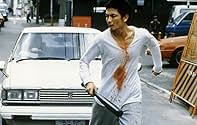- Awards
- 3 wins & 1 nomination total
Takeshi Kitano
- Azuma
- (as Beat Takeshi)
Sei Hiraizumi
- Iwaki
- (as Shigeru Hiraizumi)
- Director
- Writers
- All cast & crew
- Production, box office & more at IMDbPro
Featured reviews
Yes, it´s true: all the real great movies of the 1990s seem to be produced in the land of the rising sun! This dark cop thriller is no exclusion, because "Violent Cop" is suspense-packed, dramatic, sinister - and the actors don´t say a word too much! The dark poetry often reminded me on the films of Paul Schrader or Abel Ferrera as well as the visual brilliance and the excellent cinematography this Japanese gem contains! And, of course, main actor Takeshi Kitano is the new God of Eastern cinema! Masterpieces like "Brother" or "Hana Bi" blew my mind, and his performance of the emotional broken cop is powerful and amazing! A highly recommended film!!!
A shallow description would refer to this as a Japanese version of Dirty Harry. And it does bear some resemblance to that film, but while Dirty Harry broke the rules in order to get a criminal at any cost, Kitano's character Azuma seems to seek vengeance due not only to his lust for revenge but because he's psychotic. There's a sense that Azuma won't rest until he gets his man not out of duty but out of madness. Kitano gives what might be his best performance in this film; he is absolutely riveting. And the film itself is beautifully shot, and the score is especially good. But the best part of this is perhaps the end - the film ends on a perfectly cynical note that couldn't be topped. Seek this out.
Kitano cripples the senses and jars the nerves in his films. This is a movie about a two-fisted cop whose blunt face and cliff's edge personality drive every scene, even the ones Kitano is not in. Kitano's character is not reacting to a violent world, but infecting it with his own brand of violence. The "violent cop" has lost his hope, therefore he fears nothing.
Kitano as director gives us a real world of humor and interaction. Events happen, there's no plot. Every scene has this pulse that is raging, the characters even when still seem kinetic as sprinters. Punches, kicks, and bullets explode bodies. Kitano's character clashes with a psychotic hit man, but it is Kitano's cop who is out of control, unstoppable in his desire to inflict justice as he sees it.
There's scenes which cannot be forgotten: Kitano's cop
interrogates a punk drug dealer in a club rest room. These two actors go through a scene in which Kitano slaps this man over and over until he talks. The difference is that Kitano is really slapping this actor, and slapping living hell out of him. Cringe-worthy, and up there with one of the other scenes that illustrates what a hard man Kitano is: stabbed with a knife, Kitano grips the blade as it comes out of him, clinching his fist down on it so he cannot be stabbed again. Blood pours out from between his fingers, he cannot let it go because his fist and knife are one; Kitano understands the brutality of the fight, the reality of two men trying to kill each other, no quips, no words, no yells or curses, just blood and rage; cut to the bone, it's the way the whole film makes you feel.
As far as the recent BROTHER is concerned, it makes perfect sense for Kitano to use similar themes seen in his earlier films. BROTHER is Kitano's first real attack on American audiences. They, en mass, haven't seen his stuff, and if Kitano's going over old ground, he's doing it in HIS style. Better a retread Kitano than most of Hollywood's slobbering star-cramped idiocy.
Kitano as director gives us a real world of humor and interaction. Events happen, there's no plot. Every scene has this pulse that is raging, the characters even when still seem kinetic as sprinters. Punches, kicks, and bullets explode bodies. Kitano's character clashes with a psychotic hit man, but it is Kitano's cop who is out of control, unstoppable in his desire to inflict justice as he sees it.
There's scenes which cannot be forgotten: Kitano's cop
interrogates a punk drug dealer in a club rest room. These two actors go through a scene in which Kitano slaps this man over and over until he talks. The difference is that Kitano is really slapping this actor, and slapping living hell out of him. Cringe-worthy, and up there with one of the other scenes that illustrates what a hard man Kitano is: stabbed with a knife, Kitano grips the blade as it comes out of him, clinching his fist down on it so he cannot be stabbed again. Blood pours out from between his fingers, he cannot let it go because his fist and knife are one; Kitano understands the brutality of the fight, the reality of two men trying to kill each other, no quips, no words, no yells or curses, just blood and rage; cut to the bone, it's the way the whole film makes you feel.
As far as the recent BROTHER is concerned, it makes perfect sense for Kitano to use similar themes seen in his earlier films. BROTHER is Kitano's first real attack on American audiences. They, en mass, haven't seen his stuff, and if Kitano's going over old ground, he's doing it in HIS style. Better a retread Kitano than most of Hollywood's slobbering star-cramped idiocy.
It's nearly impossible not to watch 'Violent Cop' without thinking of Kitano's masterpiece 'Hana-bi' ('Fireworks'). As the latter is a brilliant achievement and one of the most outstanding movies of recent years, Japanese or otherwise, 'Violent Cop' must obviously be slightly disappointing in comparison. Many of Kitano's subsequent themes and style are evident in slightly embryonic form here, only not quite as successfully handled. A lot of that has to do I'd guess with Kitano having no involvement with the sometimes pedestrian script. Even so, that's not to say that 'Violent Cop' is a bad movie, far from it! It may not be Kitano's best work, but personally I enjoyed this one much more than his recent attempt at a Hollywood crossover 'Brother'. Kitano is one of the most charismatic actors currently working and every time he's on screen he is mesmerizing. He plays a tough cop with unconventional methods who finds himself caught between loyalty and duty when he discovers that one of his fellow cops is in cahoots with some local drug pushers. When his beloved sister is kidnapped, doped up and raped by members of this gang it's inevitable that he will seek his revenge. The title of the movie gives a very clear message of how he plays the game! This is probably a great place to start for newcomers to Kitano, especially those who are anticipating some kind of Woo/Lam Hong Kong action-fest. Kitano's yakuza movies are very different in approach, slower, more thoughtful and with much greater depth. I'm not a fan of Hong Kong cop movies as to me they are all style and very little substance. This is certainly not the case with 'Violent Cop' or Kitano's subsequent movies in a similar vein. It may take some a little time to grow accustomed to their style and approach, but once you have I'm sure you'll be hooked like I am. If you enjoyed this movie run immediately to your local video/DVD outlet and rent 'Hana-bi'. You will be amazed!
Violent Cop is the first directorial work of comedian and television host Takeshi Kitano. He wasn't even supposed to do this job but when the initially hired director pulled out of the project due to scheduling conflicts, Takeshi Kitano took over and rewrote large parts of the script in the process. People must have been surprised when this film was initially released because it has nothing to do with Takeshi Kitano's quirky, funny and entertaining shows throughout the seventies and eighties. Violent Cop does its title justice and is brutal, cynical and nihilistic. It is often compared to the Dirty Harry franchise but while the titular hero of the American franchise is able to keep his cool, Takeshi Kitano's main character is unstable, unpredictable and pitiless.
Takeshi Kitano plays brutal veteran detective Azuma who doesn't show much respect for his superiors, colleagues and rookies. He treats criminals the way they would actually treat their victims. The opening sequence is quite revealing in that regard as the detective follows the leader of a group of teenagers who beat up a helpless old man and proceeds to beat him up in his parents' house. The only person this detective seems to care about is his fragile sister who spent time at a hospital to treat a head injury. Once we are introduced to the detective's life, the actual plot unfolds. The detective discovers that his partner is involved in drug trafficking but before he can conduct further investigations, his partner is found hanged under a bridge. Azuma understands that the suicide had been staged and tries to track down the boss of the drug trafficking ring by any means necessary.
The cinematography of this movie is very experimental and foreshadows Takeshi Kitano's later works. The movie has few dialogues and especially the main character prefers to use his fists before asking any questions. The movie features long moments of silence and static camera work before they are interrupted by hectic sequences and brutal acts of violence. The movie is quite brutal indeed and the body count rises quicker and quicker as the film progresses. Innocent bystanders get killed, a helpless homeless man gets beaten to pulp and even a pitiful woman gets executed. The film's conclusion is particularly cynical and nihilistic but offers an unexpected twist and some food for thought.
Fans of Japanese V-cinema and enthusiasts for brutal yakuza movies will adore Violent Cop. It has an intriguing atmosphere, unusual characters and lots of violence. Despite its cynical, nihilistic and pitiless attitude, the movie is never shallow and actually offers some food for thought. The film has aged quite well and shows the dark side of Japan's society.
Takeshi Kitano plays brutal veteran detective Azuma who doesn't show much respect for his superiors, colleagues and rookies. He treats criminals the way they would actually treat their victims. The opening sequence is quite revealing in that regard as the detective follows the leader of a group of teenagers who beat up a helpless old man and proceeds to beat him up in his parents' house. The only person this detective seems to care about is his fragile sister who spent time at a hospital to treat a head injury. Once we are introduced to the detective's life, the actual plot unfolds. The detective discovers that his partner is involved in drug trafficking but before he can conduct further investigations, his partner is found hanged under a bridge. Azuma understands that the suicide had been staged and tries to track down the boss of the drug trafficking ring by any means necessary.
The cinematography of this movie is very experimental and foreshadows Takeshi Kitano's later works. The movie has few dialogues and especially the main character prefers to use his fists before asking any questions. The movie features long moments of silence and static camera work before they are interrupted by hectic sequences and brutal acts of violence. The movie is quite brutal indeed and the body count rises quicker and quicker as the film progresses. Innocent bystanders get killed, a helpless homeless man gets beaten to pulp and even a pitiful woman gets executed. The film's conclusion is particularly cynical and nihilistic but offers an unexpected twist and some food for thought.
Fans of Japanese V-cinema and enthusiasts for brutal yakuza movies will adore Violent Cop. It has an intriguing atmosphere, unusual characters and lots of violence. Despite its cynical, nihilistic and pitiless attitude, the movie is never shallow and actually offers some food for thought. The film has aged quite well and shows the dark side of Japan's society.
Did you know
- TriviaTakeshi Kitano insisted on long takes. Close-ups easily lasted 10 seconds, medium shots went on for 20 seconds and the shot where Azuma (Kitano) walks onto the bridge and into the frame lasted 57 seconds.
- GoofsBoom mic visible from behind a car at 49:28 as Iwaki approaches Azuma.
- Quotes
Azuma: Turn yourself in tomorrow.
Delinquent Kid: I didn't do anything!
Azuma: You didn't do anything?
[Rams kid's head into the wall.]
Azuma: Well, then I didn't do anything either!
- Crazy creditsThere are no opening credits beyond the title.
- Alternate versionsWhen the film was released in Swedish cinemas in 1992, it was censored with a little more than one minute for violence, the cuts were made in the following scenes:
- The policeman getting assaulted before he gets his head crushed by a baseball bat.
- The scene where Azuma assaults Hazishume on the toilet, and the finger cutting sequence.
- The following cuts are when Azuma assaults the killer in the locker room and a bloody execution scene at the end.
- ConnectionsFeatured in Seven Psychopaths (2012)
- SoundtracksGnossienne No.1
(1890)
Main theme is an electronic variation of the above title by Erik Satie
Arranged by Daisaku Kume
Performed by Daisaku Kume
Produced by Kazuyoshi Okuyama
Courtesy by Vap Inc.
- How long is Violent Cop?Powered by Alexa
Details
Box office
- Gross US & Canada
- $1,960
- Runtime1 hour 43 minutes
- Color
- Aspect ratio
- 1.85 : 1
Contribute to this page
Suggest an edit or add missing content




